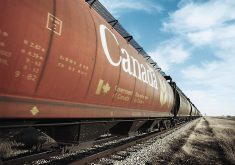It cost western Canadian grain farmers, on average, $33.69 a tonne to ship grain by rail during the 2013-14 crop year, down 30 cents a tonne from the crop year before.
And, as was the case in 2012-13, one railway was slightly over and the other slightly under the statutory Maximum Revenue Entitlement (MRE), also known as the revenue cap.
Canada’s two major railways shipped 38.76 million tonnes of western grain to export ports in 2013-14 — the most since the revenue entitlement regulations were implemented in 2000-01, Canadian Transportation Agency (CTA) figures show.
Despite the backlog in car orders last crop year, the volume of grain shipped was up almost 19 per cent from the previous crop year.
Canadian Pacific Railway Company (CP) was under its $647.27-million entitlement by $1.65 million, or an average of nine cents a tonne, the CTA said in a news release Dec. 18, 2014.
Canadian National Railway Company (CN) exceeded its $667.1-million entitlement by $4.98 million or an average of 26 cents a tonne. CN Rail will have to give the excess revenue to the Western Grains Research Foundation (WGRF), plus pay a five per cent penalty of $249,096.
The maximum entitlement was introduced to give the railways the flexibility to charge varying freight rates to encourage more efficient grain loading, while preventing the railways, considered by many to be duopolies, from gouging farmers.
With annual railway grain-shipping revenues once again close to the maximum allowed under the Canada Transportation Act, it demonstrates the railways are not competing to drive grain freight rates down, farmers and grain companies said.
“When you see the way this plays out, it says to me there isn’t much competition and there is no incentive for the railways to undercut anybody else because they have no real natural competitors,” Keystone Agricultural Producers president Doug Chorney said in an interview.
The latest results are not surprising, said Wade Sobkowich, executive director of the Western Grain Elevator Association.
Read Also

Manitoba canola industry has new frontiers
Canola oil is still the main priority for the sector, but canola meal is increasingly the subject of research looking for new markets and uses for the oilseed’s byproduct.
“We know the railways try to meet the cap and that means they are trying to earn as much revenue as they can and if it was gone you can be sure that they would well exceed the ceiling that the cap would otherwise have in place,” Sobkowich said in an interview.
Chorney said removing the maximum entitlement, which the railways have requested, would hurt farmers.
“If we remove the cap, we know prices will only go one way,” Chorney said. “There’s no precedent of the railways passing on efficiencies that they have realized to their customers. They go for the maximum return every time and if we raise the cap by more, they would raise their price by more and still not provide us the service we think we should be having.”
The maximum revenue entitlement is adjusted for the amount of grain the railways haul and the distance it’s hauled. The more grain the railways move, the higher the amount of revenue they are allowed to earn.
The CTA adjusts the maximum revenue entitlement for inflation. However, the entitlement formula, is based on railway costs from 20 years ago. The grain-handling and transportation system is more efficient now.
In 2010, consultant John Edsforth estimated the railways received an extra $4.61 and $8.81 a tonne in the crop years 2007-08 and 2008-09 because the formula was based on old railway costs.
A request for a costing review is just one of many recommendations a coalition of Saskatchewan farm groups submitted late last year to the Canada Transportation Act review panel.
CN Rail said in a statement Dec. 18 it’s reviewing the CTA’s calculations and noting CN exceeded its entitlement by less than one per cent.
CN also said the 19.2 million tonnes of grain it moved in 2013-14 was 12 per cent more than its previous best movement of 17.1 million tonnes, since the entitlement regulations came into force 14 years ago.
“CN is fully in sync with the grain supply in Western Canada, where end-to-end balance has been restored, and continues its record-setting grain movements in the 2014-15 crop year,” CN Rail said. “Western Canadian grain is the only commodity CN transports that is subject to a revenue cap imposed by government legislation.”
While the Western Grains Research Foundation can put CN’s overage and penalty to good use, the organization’s chair Dave Sefton said as a farmer he would prefer the railways not exceed their entitlement.
One or both railways have exceeded their revenue entitlement 10 out of the last 14 crop years resulting in railway payments to the WGRF totalling more than $82 million. Most years the overage and penalties are small. The biggest transfer — $66.6 million — occurred in 2007-08, when both railways exceeded their entitlements, according to a WGRF news release.





















